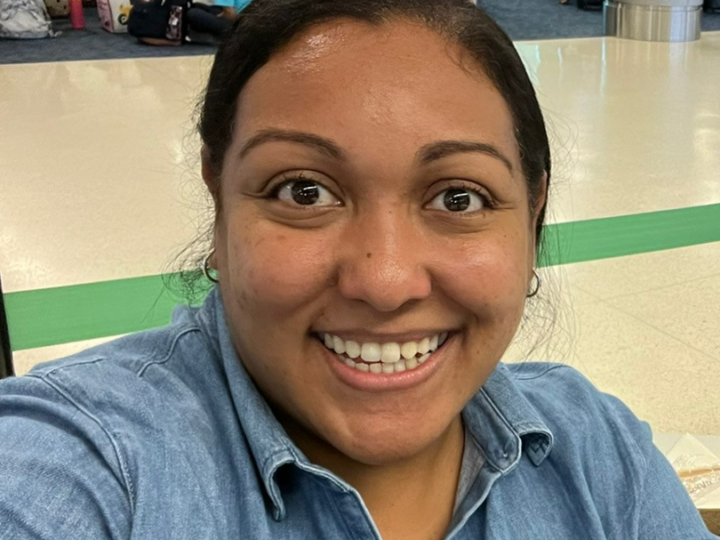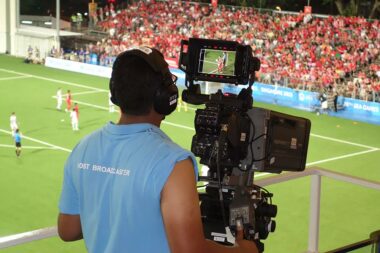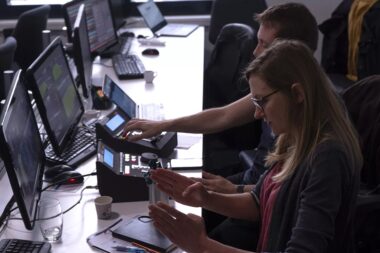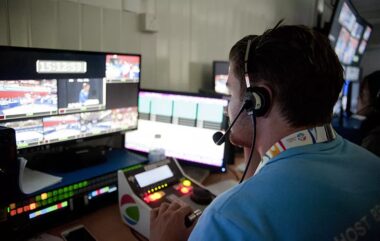
Laura McDonald

‘CARIBBEAN SISTERS’ BUILDING REGIONAL SUPPORT NETWORK
LAURA McDONALD & ASHLEY MOORE
Concacaf Replay Operations, New Jersey
“Without the courses I’d probably have never met Ashley, or other people doing similar things in the Caribbean. Concacaf allowed us to get closer to our neighbours, so to speak.”
For Laura McDonald, a sports director hailing from Jamaica, the advantage of professional training can be seen just by looking at her own career path and the connections she has made from such experiences.
Having taken part in three Concacaf courses designed to upskill broadcast professionals in the North American and Caribbean region, Laura has grown her own personal experience and also started to build a support network through contacts made during these sessions.
It is this factor which has really made a difference since the industry came back to life after the COVID-19 pandemic put everyone on pause. “On the last Concacaf course I attended, Replay Operations in January 2022, I met some other professionals from Barbados,” Laura explains. “One of those was a woman, and we really hit it off, we have kept in contact after the course”
This other professional was Ashley Moore, one of only two female replay operators working in the Caribbean region. “Seeing another female face for the first time as an operator and director was a bonus for me,” explains Ashley of the meeting at EVS’ New Jersey facility. “There are very few women who enter technical fields in sports broadcasting. It is a very male dominated profession and there is sometimes a feeling that we, as women, can’t do it.”
Ashley is grateful that Concacaf contacted her about the Replay Operations training session. “Training opportunities in Barbados are few and far between, plus those that we have are expensive and mostly out of reach for those wishing to further hone their skills,” Ashley reveals. “Before this training, I had never received formal training in the role. I attended the course to further my knowledge and to learn how people outside my immediate reach approach being a replay operator.”
The Concacaf training events, held as hands-on ‘live-like’ situations, allow attendees learn the fundamentals without the pressure of the real-world environment. “It helped us to boost our confidence levels,” Ashley says. “We did the sessions without being judged.”
Confidence is key, as Laura continues. “Sometimes as a director, you need the games under your belt to build your confidence. By getting more games you become more comfortable and by being more comfortable you become more confident. It might not always be a big 24-camera game, but, in fact it is harder to tell a good story using less cameras. The Concacaf courses give us the fundamentals for any situation. I’m really excited about that. I can see I am growing.”
With COVID-19 hitting many major sporting events over the last two years, opportunities to grow have been somewhat reduced, but for both Laura and Ashley the chance to pick up where they left off is being taken with relish. “I didn’t really get back on the road and in full swing until the Concacaf Gold Cup in 2021,” Laura remembers. “That was really exciting to get back out. Now in 2022 I have been directing Concacaf Nations League and W Championship qualifiers.”
Ashley has also got back to business. “I have been involved with Concacaf Nation’s League and Women’s Championship qualifiers, as well as track and field events and the World Surf League event in Barbados.” Having never intended to get into sports broadcasting, that roster of events comes as a bit of a surprise to Ashley. “I got into the media industry in 2011, at that time my sole attention was on the film world. I never thought of broadcast as an avenue. Eventually I got drawn in when I worked on a project to help local footballers get the marketing we felt they deserved.”
The pair both thank Concacaf for the courses, but mostly for bringing them and their colleagues across the Caribbean region together. “It’s really phenomenal, I get to grow, I get to learn and, most importantly, I get to have fun. Without the courses I’d probably have never met Ashley, or other people doing similar things in the Caribbean. Concacaf allowed us to get closer to our neighbours, so to speak,” Laura explains.
“She is my Caribbean sister,” Ashley adds. “We are still in contact, we share feedback to improve ourselves. We’re very grateful to the Concacaf course. It’s a great opportunity for networking, sharing experiences and receiving tips and advice.”
The sharing experience allows knowledge to filter down from participants to their colleagues when they return home. “I know I’ve been able to train other replay operators, both men and women, the correct approach to do things and to pass on the philosophy of being a replay operator,” Laura states. “I’ve been bringing through more women, training them as venue producers here in Jamaica and having them work on some of the Concacaf Nations League matches so they too can also build their confidence.”
As role models for their peers on their individual islands, Laura and Ashley have become good friends and keep each other motivated. “Even though I’m in Jamaica and Ashley is in Barbados, I took her on like my little sister,” Laura smiles. “If she is going off to a game, I check in on her, I’ll ask ‘How was the game, give me your feedback, how can you improve?’. We message each other to say: ‘You got this!’. The thing is, Ashley is really talented and it is really good to just keep everyone connected. The more we learn, the more we can keep uplifting each other.”
CONCACAF BROADCAST TRAININGS OPENING DOORS FOR REGIONAL TALENT
Live Sports Direction Course, United States
“It is a big investment, for countries in the third world, without Concacaf we really would not be given these opportunities to learn and to be covering games at this level. It’s not just encouraging the share of knowledge, it is also giving us income. The trickle-down effect, it is changing our lives.”
For Laura McDonald, a Director and Producer with Phase Three Productions in Jamaica, the Live Football Direction courses given by Concacaf have given her access to priceless guidance and industry knowledge, tangible directing experience and – most importantly – self-confidence and belief in her abilities.
“Every time I am doing a live game for Concacaf, Oscar Sanchez [Concacaf Director of Broadcast Operations & Executive Producer] picks up the phone and calls me. We just have a chitchat and he reminds me to have fun. Those little calls mean so much, there is somebody with so many responsibilities and I’m just doing my one game, but knowing there is someone belonging to a large confederation believing in my talent and choosing me to do a particular job means so much.”
Concacaf have been running the Live Football Direction courses, assisted by the Broadcast Academy, at their Miami headquarters since 2018. Over that period, they have trained 32 participants from 7 countries in areas such as Guatemala, Haiti and Costa Rica. Industry experts such as John Watts and Sebastian von Freyberg have helped Concacaf raise broadcast production standards and develop skills within the North America, Central America and Caribbean regions.
For Laura the Concacaf courses have broadened her repertoire and opened directing football up as an avenue she never imagined taking in her career. “I was doing a lot of entertainment shows, and I love track and field so I had started doing a lot of track meets – that was my comfort zone. I directed Usain Bolt’s last race in Jamaica and some pretty big gigs, but I’d never ventured into football. When Concacaf introduced these training courses I thought ‘This is perfect’. I’d always wanted to direct football but my confidence wasn’t there, it didn’t feel like my safe space. Concacaf gave me the opportunity.”
Laura began working with Concacaf when Phase Three Productions were contracted to cover matched for the confederation in Jamaica. “I started as a venue producer, which was basically managing the communication between Concacaf, the stadium operators and the TV production crew. I would be reporting back to Oscar at Concacaf, and he said to me one day ‘You are technical, you direct boxing and all these other sports, come and do this directing course’.”
Since then Laura has gone on to direct matches for Concacaf in Jamaica, Cayman Islands and Anguilla, becoming the first female football director in the region. “It didn’t sink in until I went to Concacaf to participate on their course. I was looking at the wall that showed everything they cover and I realised ‘Hey, this a big deal’… Canada, Mexico, the USA, and all throughout the Caribbean.”
Importantly for Laura, her participation in Concacaf’s courses does not just boost her skills, but she is also able to share that knowledge with her colleagues and teams. “Before one of the matches I directed I took some of the information I had gathered from the course and used it as an example in my camera meetings to show the crew what I wanted. After the game I got some real high praise for my Camera 1 operator and I could explain that this was his first time doing it, but he got it perfectly right. I feel it is my duty to impart that knowledge and showcase the skills that are here in the islands.”
Coming from a company whose co-founder and Executive Chairman is female and has advocated for Laura to be given opportunities to progress all through her career, her desire to help the next generation step up is strong – but it has to be a two-way street. “I’m an advocate for inspiring other women, and young people, who want to work in live sports coverage, but at the same time you can’t just be passionate about it – you have to show me that are willing to put in the work.”
Having her own intern at Phase Three has seen Laura’s journey go from mentee to mentor. “I took on an intern eight years ago and she loved sports, she knew all the teams and players and I saw that she worked very hard. I’ve now passed on my knowledge and the confidence as a woman to say ‘Hey, you can do this’. I can give her jobs in the same way I got the opportunity from my chairman. Now on most football matches I’ve done since taking the course she has been my assistant. When the Concacaf Gold Cup came to Jamaica in 2019, I made sure to introduce the directors and producers to her so she could take some tips from them and understand the ways they do certain things so she can get that knowledge for herself as well.”
With Concacaf’s commitment to broadening the talent pool within its region, it can be sure that in the future when major events take place within the territory that they can call upon their own local experts. “The major takeaway from the course was that I picked up confidence. Being a director and calling the shots is one thing, but believing in yourself and knowing that you are doing the right thing and are able to communicate that to your team so they will follow the same path is so important.”
“Concacaf has really stepped up by offering these courses, by giving us the opportunity that we wouldn’t normally get in the islands. These kind of programmes are not available to us, or, if they were, people cannot afford them and would not invest in themselves. We can say now, ‘Hey, you don’t need to just import international staff, you can call on your own Caribbean people and highlight the skills of the islands’.”
For Laura, that future is what excites her. Full of ambition her goals are now clear. “My dream now is one day to direct a Concacaf Gold Cup match. One day I want to see women not just working in production but directing regularly at a high level. The Concacaf course has whet my palette with live directing – now I want more!”
Discover Our Courses
The Broadcast Academy activities are conducted in various forms. Training is delivered in the form of masterclasses, seminar and workshops. Our services include consultancy for sports broadcasters to help them achieve their goals of hosting and broadcasting international standard sporting events.


